Engaged Anthropology Grant: Madhura Lohokare
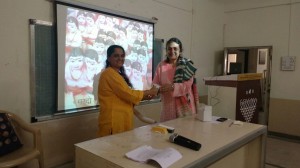
In 2010 while a doctoral student at the University of Syracuse Madhura Lohokare received a Dissertation Fieldwork Grant to aid research on “Articulating Public Space to the Public Sphere: A Study of Neighborhood Associations in Pune, India,” supervised by Dr. Cecilia Van Hollen. In 2016 Dr. Lohokare had the opportunity to share the results of her fieldwork when she received an Engaged Anthropology Grant to aid engaged activities on “Seeking Just Spaces: Conversations on City, Masculinity and Gender”.
My doctoral research was based in a working class, low caste neighborhood in the Western Indian city of Pune in India. In my doctoral research, I located young men’s gendered identity at the crossroads of their location in the inner city area of Moti Peth and a long history of spatial and social marginalization based upon caste and class in Pune. After submitting my dissertation in April 2016, I was awarded the Wenner Gren Engaged Anthropologist Grant in order to conduct public engagement activities in Pune. The public engagement that I undertook within the EAG were constituted primarily by two activities: bi-lingual workshops on gender, masculinity and urban space in city colleges and a short-term neighborhood mapping project in Moti Peth
Workshops on gender, masculinity and urban space:
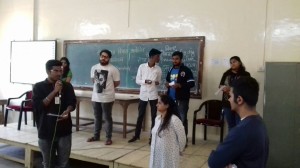
These workshops were designed to focus on how urban spaces are shaped by and in turn shape gender, caste and class dynamics in the city spaces and on the question of inclusive cities and access to public spaces. The aim was to conduct these workshops primarily in those colleges in the city which do not figure on the itineraries of such workshops. Located in the older part of the city and attended largely by non-English speaking, working class, lower caste students, these colleges seldom get exposure to stimulating workshops beyond their fixed college curriculum, on account of the fact that most of such workshops and their materials tend to be designed for an English speaking audience.
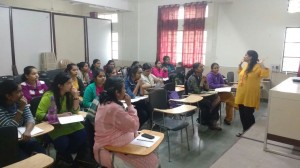
During December 2016, 2017 and January 2018, I conducted four workshops, titled, “Mardon Waali Baat” (roughly translated as “The Man Thing”) in four undergraduate colleges which focused on the broader themes of masculinity, gender and public space. These workshops were mostly conducted in Marathi, the native language of the state of Maharashtra, given the fact that most of the students who attended these workshops were native Marathi-speakers. These workshops were two to three hours long each, focusing on gender, qualities attributed to masculinity in the specific context of Maharashtra, popular culture and the implications of gendered nature of public spaces. The participants comprised of not only students from Pune city, but importantly, also those from neighboring small towns and villages, who come to Pune for higher education. This is also the student population which hardly gets an opportunity to attend such workshops, which provide a non-judgmental space for young adults to discuss issues of gender. Interestingly, I conducted a series of two workshops on the topic of masculinity and urban space in an all-girls college. While I had originally planned only one workshop here, I conducted two workshops in this college, on account of the enthusiasm of the girl students to talk about gender, masculinity and how it impacts their everyday life in the city.
Between December 2016 and December 2017 I also conducted three workshops, with the Department of Sociology and the Women’s Studies Centre at Pune University on the broad themes of ethnographic research methodologies and researching caste, space and gender. All the three workshops were two days long. My objective in working with students and research scholars from Pune University was specifically to discuss ethical issues of working on caste and gender with a group of research scholars who are located in a state university, a space which does not have the privilege of availability of study materials in Marathi.
A short-term neighborhood mapping project in Moti Peth:
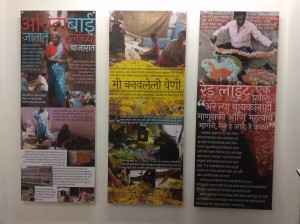
An important insight of my dissertation research was the profound sense of internalized inferiority that I encountered in Moti Peth, the neighborhood where I conducted my dissertation research. This internalized inferiority was a product of a long history of caste and class-based marginalization in Pune’s urban trajectory. A short-term project in which neighborhood inhabitants map how their area contributes to the economic workings of the city would be, I thought, a modest beginning to a larger process of reclaiming the history through which they have built and through which they continue to give character to this part of the city. This mapping project, I had hoped would help to reveal this intricate web through which the area of Moti Peth is connected to the city of Pune in inexticable ways.
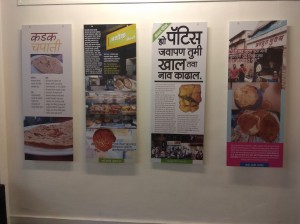
I initiated this project in Moti Peth, in the first week of December 2017. After initial rounds of discussion and introducing the young people in the neighborhood to the idea of this mapping project, a total of six women (between ages 18 and 30) and four men (between ages 22 and 26) volunteered to be a part of this exercise. The aim was to introduce them to the concept of the “barefoot researcher” and enable them to critically look at their neighborhood, along with equipping them with basic documenting skills, which would encourage them to produce knowledge about their own area. Each participant received a small stipend for participating in this exercise.
The participants worked in pairs on specific topics related to their neighborhood and aspects of their culture. These included:
- Mapping small businesses in the area
- Highlighting the language (slang) used by people in the neighborhood
- Documenting caste-specific recipes in this neighborhood
- Documenting the ten best street food joints in the area
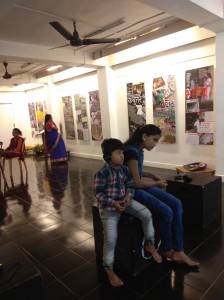
These topics were arrived at through our discussions, in which we all agreed that it was important to rewrite the narrative of this neighborhood, which hitherto has only been portrayed as “backward,” “filthy” and as populated by people who themselves are morally corrupt or not worthy of respect. These topics are reflective of an attempt to claim legitimacy by this group of working class, low caste researchers for their location in the city, be it in terms of food, language or economic activities.
In December 2017, I conducted three workshops which aimed to familiarise the participants with aspects of documentation and research including photo-documentation (via mobile phones), participant observation, writing field notes, interviewing and visualizing data. One of the workshops was conducted by Chris M. Kurian, a public health professional, who also specializes in design and communication and Chaitanya Modak, a graphic designer, with experience in public art.
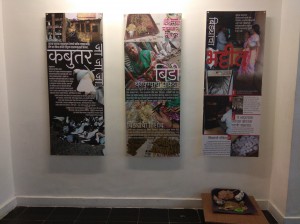
The outcome of these multiple small projects was imagined in the form of an exhibition, through which we planned to showcase the narratives that the “barefoot researchers” had produced, in the form of photo-stories, interviews, maps and audio clips. Chaitanya Modak joined the team as a consultant, and helped us visualize this data and present it in an accessible and attractive format to the audience for this exhibition.
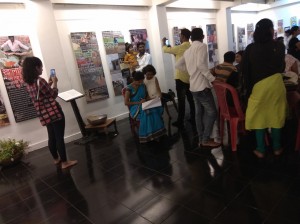
The exhibition was held on April 21st and 22nd 2018, in Sudarshan Kaladaalan, an exhibition space located in a predominantly upper caste neighborhood in the city. The choice of the place was deliberate since the researchers from Moti Peth specifically wished their narratives to be exhibited in these upper caste dominated neighborhoods. The exhibition was well received by the audiences and also got good press coverage in the local Marathi and English dailies. The experience of producing and exhibiting narratives of their own lives and aspects of their culture, in their own language, was a very important step for the young people from Moti Peth, to begin the process of reclaiming their place in the city’s identity. I hope that this exhibition also gets an opportunity to travel to other parts of the city (there were several proposals to enable that in the future). At the same time, the exhibition also benefitted from some critical feedback, which would help its evolution, in case the participants now decide to take this ahead and travel with it. This feedback was largely in terms of the politics of representation, the absence of a sense of history in the exhibition material and the need to demonstrate the process through which this exhibition was produced.